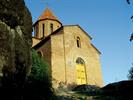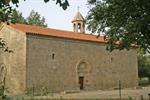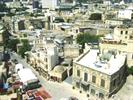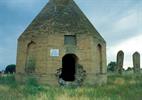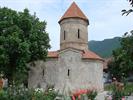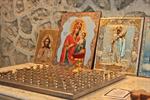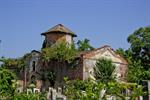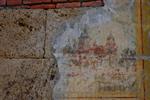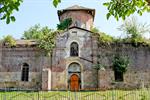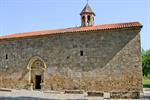Christianity influenced Azerbaijan by means of the Caucasus Albania in the first years of the new era in times of Christ's apostils. The inflow of Jews to the Caucasus intensified after the overthrow of Jerusalem. The new comers told about the wonders that had been demonstrated by Jesus. The first Christian communities established under the influence of such propaganda. The first stage of spreading of Christianity was called the period of apostils in connection with apostils Varfolomei and Faddey. One of the progenies of apostil Faddey started to spread the new religion by the benediction of the first patriarch of Jerusalem Yegub reached the land of Agvan and erected a church in Kish village. This church had been constructed before the first Christian church of Armenia. Later Yelisey moved to Chola (Derbend) and passing the river Samur continued to propagandize the religion and was killed by one of idolaters of Helmes village and thrown to a hole. Later Yelisey's corpse was lifted from the hole by the instruction of Albanian melik Vachagan and buried in Khug village, and a small temple was erected over the hole.
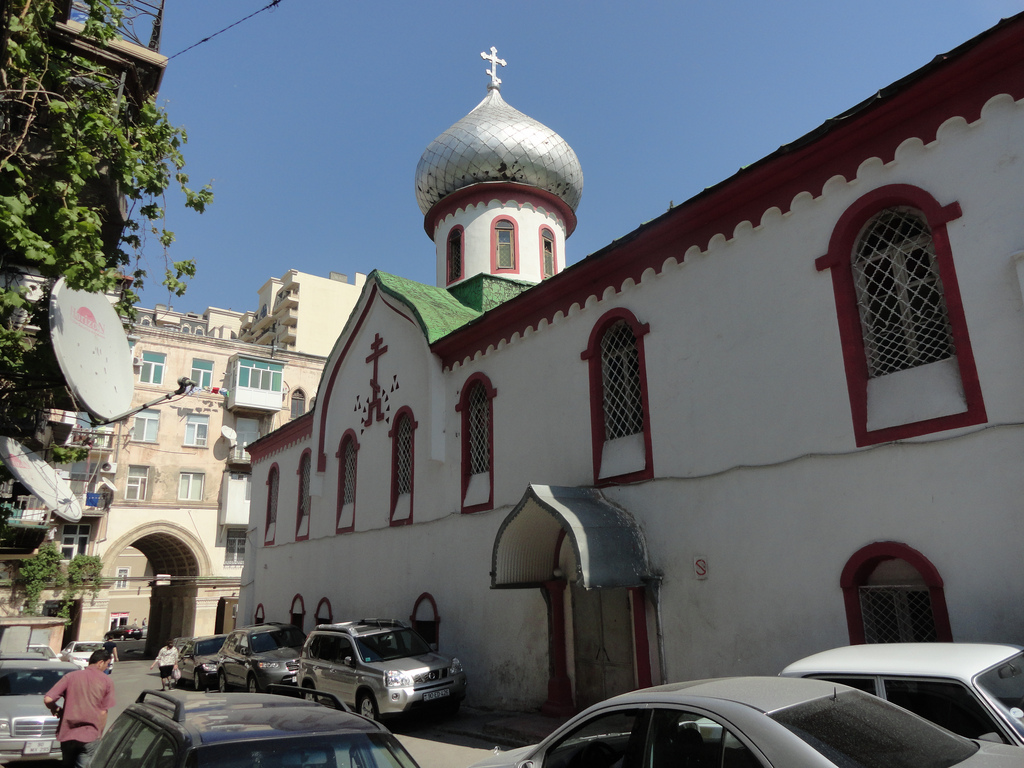 When Roman emperor Constantine lifted veto from practice of Christianity in 313, Albanian ruler Urnayr declared Christianity the state religion. A new stage in the spread of Christianity called the period of pro-Greek emerged in Azerbaijan since that time. Academician Ziya Bunyadov points out that Urnayr, Vache the second and Vachagan the third fought for spreading Christianity in the country. The priesthood and church hierarchy formed in the 3rd-4th centuries. Feudal lords allotted special area for churches on their lands by the instruction of the Catholicon. Churches were built in the region and religious books were translated from Syrian, Arami and Greek language to Albanian. The book "In Albanian script and Albanian language is considered the most ancient public reader of the world Christianity.
When Roman emperor Constantine lifted veto from practice of Christianity in 313, Albanian ruler Urnayr declared Christianity the state religion. A new stage in the spread of Christianity called the period of pro-Greek emerged in Azerbaijan since that time. Academician Ziya Bunyadov points out that Urnayr, Vache the second and Vachagan the third fought for spreading Christianity in the country. The priesthood and church hierarchy formed in the 3rd-4th centuries. Feudal lords allotted special area for churches on their lands by the instruction of the Catholicon. Churches were built in the region and religious books were translated from Syrian, Arami and Greek language to Albanian. The book "In Albanian script and Albanian language is considered the most ancient public reader of the world Christianity.
At a session in Khalkidon church in 451 Albania preferred monophisitism and the fight between monophisits and poliphisits strengthened in the country in the 5-6th centuries. Albanian church accepted diophisitism in the late 6th-early 7th century.
The residence of Albanian Catholicon located in the Gochay city and it moved to Barda in 552. After the overthrow of Albanian meliks the role of Christianity weakened in the country the prayers were conducted in Armenian language in the churches, Albanian language was oppressed and led out. Albanian church restored its status of the autocephaly church during the formation of independent states on the territory of Azerbaijan in 8th-9th centuries. Eastern Christianity managed to retain its influence on the region in 10th-11th centuries. This state lasted till 18th century. Albanian church was abolished by instruction of Synod in 1836 and the hole property of the church was delivered to the Armenian church of Echmiadzin.The Albanian church was once more restored in the 1980-1990s. The Albanian-Udi Christian community was registered by the government in 2003, following the restoration of the Kish church in Sheki. The church of Nich village is currently being restored in Gabala district.
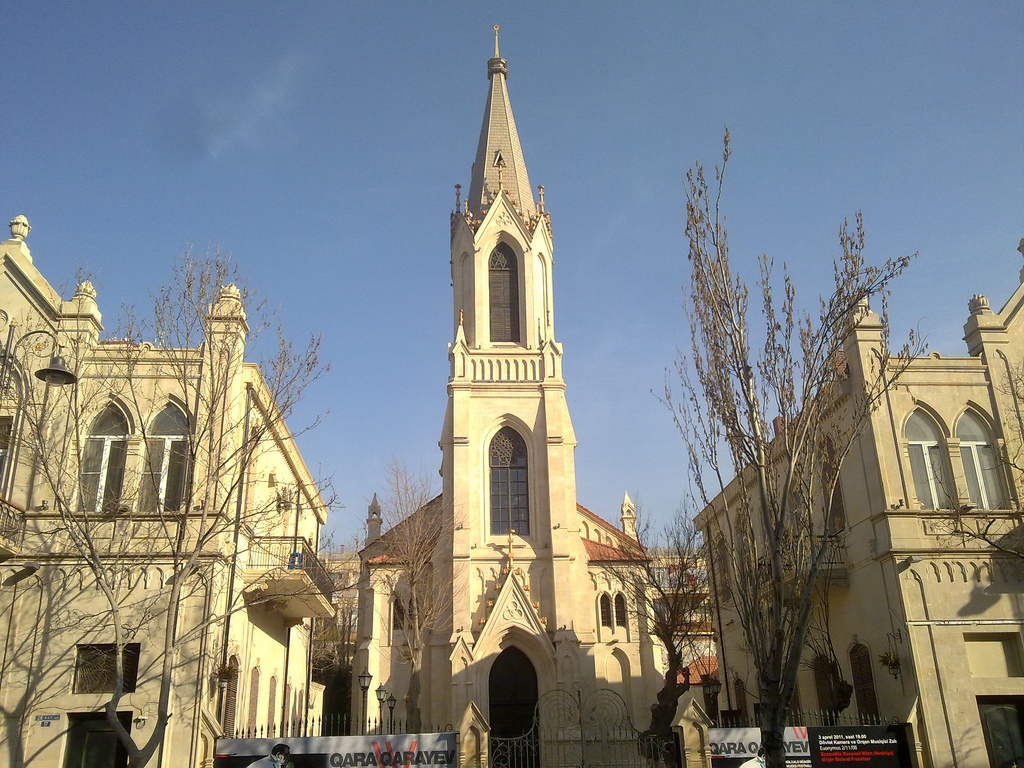 Christianity was represented by orthodoxy, Catholicism and Protestantism and by a number of sectarian communities in Azerbaijan. Five Armenian-Gregorian communities have been registered in the country.
Christianity was represented by orthodoxy, Catholicism and Protestantism and by a number of sectarian communities in Azerbaijan. Five Armenian-Gregorian communities have been registered in the country.
Orthodoxy was imported to Azerbaijan in frames of the policy of resettlement led by the Russian tsarist regime in early 19th century. The first orthodox church of Baku started operating in 1815.
Sectarian Christians were driven to the Caucasus to avoid the hard consequences of separations occurring in the Russian Orthodox Church. The first Russian migrants set up Alty-Aghadj village in Shamakhy in 1834, Vel village in Lenkoran in 1838, Borisi-Russian village of Yelizavetpol in 1842 and Slavyanka village in 1844. Baku province accounted for 21 sectarian villages with the population of 13 thousand people in 1868.
Catholicism. The Roman Catholic Parish was created in Baku due to the resettlement of military Catholics to the Caucasus by Russian Army in the 1850s. The parish was under the military Roman-Catholic parish of Tetri-Skaroda (Georgia). The Baku parish became independent in 1882. The church in glorification of the Immaculate Conception of Saint Maria was erected in 1895, the church of the Holy Cross was constructed in the Baku cemetery in 1903. The new church of the Immaculate Conception of Saint Maria which is considered the most beautiful architectural monuments of Baku was built in a gothic style in 1909-1912. The Roman-Catholic community was restored in Baku in 1999. The community established its temple in 2001. TA piece of land has already been allotted for the construction of Roman-Catholic church in Baku. Former Roman Pope John Paul the second paid an official visit to Baku on May 22-23 of 2002.
Baptism. The followers of the Lutheran church arrived in Baku along with German industrialists taking part in the development of oil fields in the second half of the 19th century. The visit was mainly caused by political and religious unrest that took place in Germany in early 19th century. At that time people rumored that the West is nearing the Apocalypse only the East may save everyone. The population and especially the sectarians tried to run away from the questions about the Apocalypse to Russia and the Caucasus. 209 German families resided in Azerbaijan early 1819. The Lutheran community was established in Baku in 1870. The community members constructed their temple-circa (currently the hall of Organ and Camera Music) in Baku in 1899. The circa had been built even earlier in Yelendorf (present-day Khanlar). The priests of Lutheran church along with representatives of other religious communities were sent into exile and executed by shooting in 1937. The Lutheran community resumed its activity in Baku in 1944.
|
Important information on visa: If you're going to vizit Azerbaijan check the latest information of visa regime here >>>. Regularly updated data, helpful advice and expert guidance. If you have any questions, please do not hesitate to contact us. |




